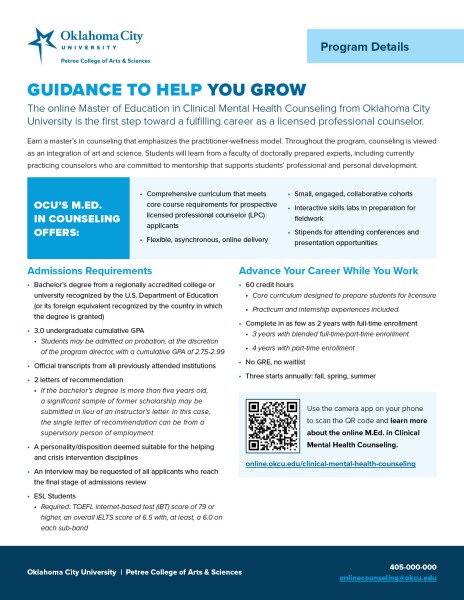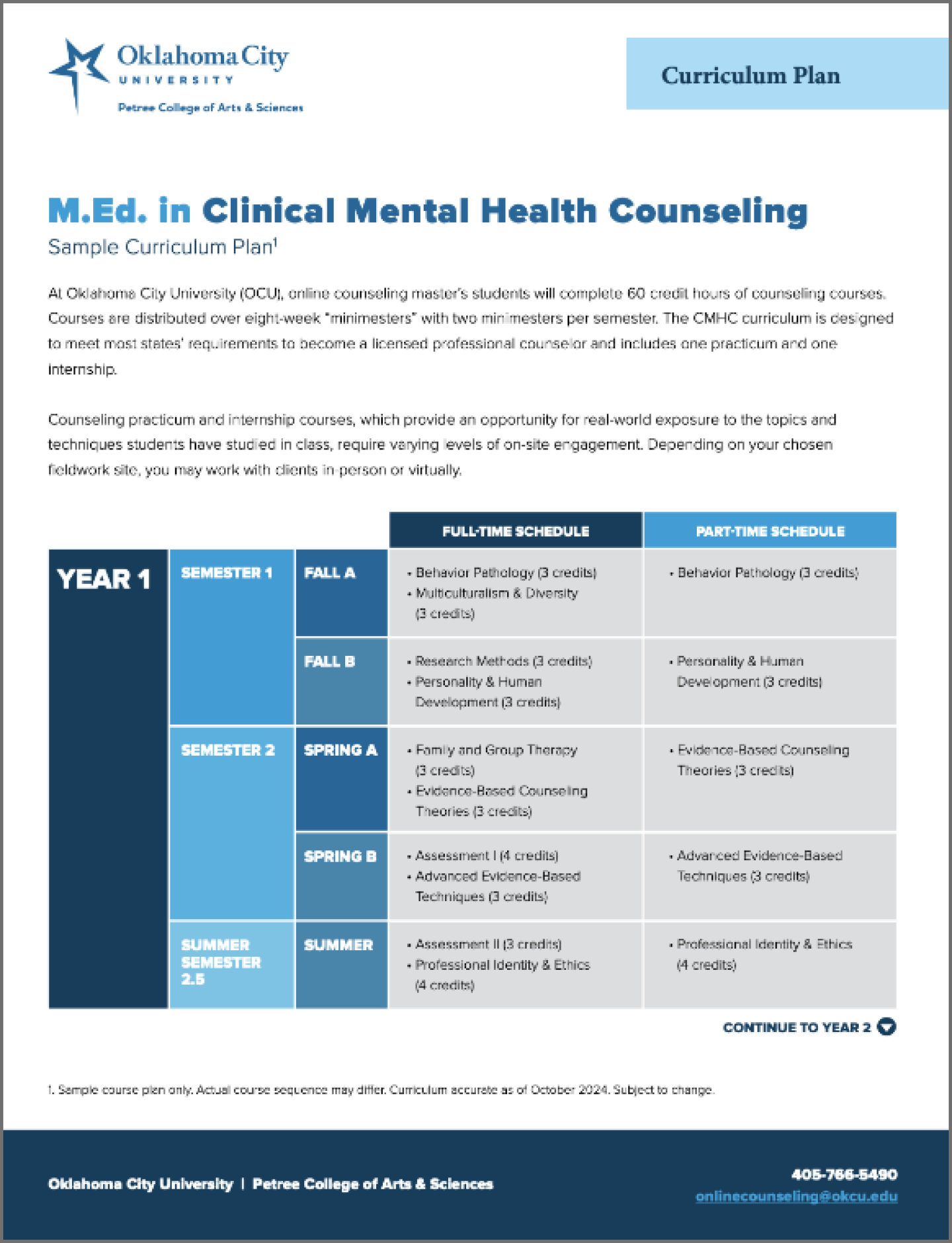Kick off your counseling career with a master’s program that was made for you
Oklahoma City University’s online Master of Education in Clinical Mental Health Counseling delivers on all fronts. From flexible online program delivery to a comprehensive curriculum designed to meet licensure requirements, you’ll build a valuable foundation for your career as a mental health counselor.
OCU’s curriculum encourages self-reflection and professional development while also meeting core counseling competencies as indicated within the American Counseling Association guidelines. Courses use empirically supported teaching strategies to engage students with specialization topics like, research, evidence-based counseling techniques, adolescent counseling, marriage and family therapy, and others.
Leveraging Microsoft Teams technology, clinical skills labs are conducted online and are led by instructors with PhDs in counselor education and supervision. Labs will be completed in small cohort groups to prepare for field placements.
Internship and practicum courses offer an exciting chance to immerse yourself in real-world experiences, all while fulfilling essential licensure requirements.
Program Details
- 60 credit hours
- Fully online
- Comprehensive counseling curriculum:
- Approved by the National Board of Certified Counselors
- Approved by the Oklahoma State Board for Behavioral Health
- Meets or exceeds board requirements of other states
- Flexible and remote clinical skills labs Practicum and internship included
- Complete in as few as:
- 2 years with full-time enrollment
- 3 years with blended full-time/part-time enrollment
- 4 years with part-time enrollment
This will only take a moment.

Small classes, online flexibility, and a proven curriculum make Oklahoma City University's online M.Ed. in Clinical Mental Health Counseling a clear choice for your career. Learn more by downloading a program brochure.

Flexibility without sacrifice
Learning online doesn’t mean a subpar experience. No matter where you’re located, you can expect the high-quality education OCU is known to deliver on-campus. Dedicated student success coordinators can help you navigate the online learning platform and helpful, experienced faculty and a close-knit online cohort will provide crucial insight and support as you prepare for licensure.
Counseling practicum and internship experiences
Focus on connection

Picture your counseling master’s with a curriculum timeline
See a sample curriculum plan to get a better idea of your potential course load over each semester. With both full-time and part-time options, students can choose what works best for them.
Online Master of Education in Clinical Mental Health Counseling core curriculum
All counseling master’s students will complete 60 credit hours of counseling courses designed to meet most states’ requirements to become a licensed professional counselor, including one practicum and one internship.
COUN 5303 Biological Bases of Behavior and Health (3 credit hours)
COUN 5314 Assessment I (4 credit hours)
COUN 5563 Family/Group Interventions (3 credit hours)
COUN 5603 Social & Community Behavior (3 credit hours)
COUN 5703 Behavior Pathology (3 credit hours)
COUN 5714 Evidence-Based Counseling Theories (4 credit hours)
COUN 5813 Career Development (3 credit hours)
COUN 6313 Assessment II (3 credit hours)
COUN 6513 Multiculturalism & Diversity (3 credit hours)
COUN 6713 Advanced Evidence-Based Techniques (3 credit hours)
COUN 6776 Practicum (6 credit hours)
COUN 6813 Personality & Human Development (3 credit hours)
COUN 6903 Research Methods (3 credit hours)
COUN 6913 Clinical Supervision (3 credit hours)
COUN 6974 Professional Identity & Ethics (4 credit hours)
COUN 6979 Internship (9 credit hours)
Your future as a mental health counselor

What comes after graduation? Once you complete your degree you’ll have completed the academic requirements for becoming a licensed counselor (to make sure you know the exact requirements, please check the website of the state board of counseling where you plan to practice). However, to become an LPC you’ll also need to complete post-graduate “supervision” or “supervised experience” hours and pass the exam required by your state board of licensure. Some states may also require passing a jurisprudence examination or completing additional training before you officially apply for licensure.
